Author Archive
Public Administration Quarterly Vol.20 No.3
Twenty-First Century Budget Reform: Performance. Entrepreneurial, and Competitive Budgeting.
Thomas D. Lynch
Cynthia E. Lynch
Louisiana State University.
ABSTRACT
This article looks at the possible public budgeting evolution that will take place as a result of the changes brought into place by the information revolution. The authors argue that a fundamental historical change. They first examine progressive reform movement and the forms of public budgeting so common in government today, they then look at the futurist literature to describe the remarkable changes brought to society due to the information age. From that literature the authors argue that a new form of budgeting is starting to emerge. If they are correct, the we are entering into a new era with important implications for public budgeting. Although many positive results may occur with these new budget reforms, there are some negative realities that might also provide serious headaches for tomorrow’s leadership. The authors conclude by examining those implications.
INTRODUCTION
This article speculates on the likely budget reforms that will be successful in the next century and the problems that will be associated with those reforms. The first part of the article presents the last major set of budget reforms that flowed out of the Progressive and Liberal Eras and its impact on how budgeting is predominantly done today. The second part discusses some negative implications of this new type of budget reform. The article concludes with a few observations.
Public Administration Quarterly Vol. 19 No. 4
Thomas D. Lynch
Susan E. Day
Florida Atlantic University
INTRODUCTION
How do you know what have you received for you money? The private sector has a general term to answer that question–widgets. What are widgets in the public sector? The public sector focuses on the financial resources used to produce our products and services rather than the products and services produced. Political processes determine input decisions and elaborate budgeting and financial management techniques are employed to ensure accountability.
What about monitoring and consequences of our public programs, the products and services produced by our government agencies, and the day-to-day activities within our bureaucracies? To the extent that our government tracks the answers to these questions, we do so with performance measures. They are the widgets of the public sector. As Epstein (1988:3) points out, “[T] he simplest way to think of this topic is by analogy to the private sector: performance measurement is government’s way of determining whether [or not] it is providing a quality product product at a reasonable cost.”
This article reviews the evolution of the governmental performance measure concept and comments on its contemporary development in four sections: history, state of the art, theoretical considerations, and conclusions. The history section traces the evolution of government performance measures. The section on the state of the art reviews current applications measurement systems at the international, national, and state and local levels . The theoretical section discusses the change in conceptual assumptions concerning performance measurement. The last section suggest the implications of the current developments in this movement is the terms of contemporary and future public administration.
The Word of the Light
The Word of the Light

All Rights Reserved
ISBN: 1-883697-51-4
Library of Congress Catalog Card Number: 97-075003
Introduction
This book is titled The Word of the Light because is about God’s spiritual wisdom found in the fundamental writings of every religion. In those writings. “light” and “word of the Light” are common metaphors for spiritual wisdom. The assertion that spiritual wisdom is the permanent universal truth of God raises some problems. One is that many people and groups claim to know the spiritual wisdom on virtually every subject. Conversely, many others claim that spiritual wisdom does not exist.
Given these conflicting claims about spiritual wisdom, how can we decide what spiritual wisdom is? The sciences use the Scientific Method of decide “Acceptable knowledge or truths,” but postmodernist philosophers argue that realistically there cannot be any universal truths about god or anything else (Grenz: 1996). Although we understand that philosophy has not developed any totally accepted proof for the acceptance or the denial of God’s existence, we wrote this book under the assumption that God does exist, simply based on our faith. We also believe He has been communicating His spiritual wisdom to humankind continually throughout time and that we can read that wisdom in the most sacred books of the world’s religious traditions. To isolate the spiritual wisdom used in this book, we applied the simple method of consensus. If a given spiritual wisdom is common to the five major current religious traditions (i.e., Hinduism, Judaism, Buddhism, Christianity, and Islam), we consider the spiritual wisdom as universal and authentic.
© 1998 by Thomas D. and Cynthia E. Lynch
Policy Analisys in Public Policymaking
Policy Analysis in Public Policy making
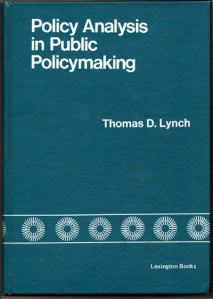 Library of Congress Cataloging in Publication Data
Library of Congress Cataloging in Publication Data
Lynch, Thomas Dexter, 1942-
Policy analysis in public policy making.
Bibliography: p.
1. Transportation and state-United States. 2. Program budgeting-
United States. 3. Decision-making in public administration-Case studies.
HE206.2.L9 380.5’0973 74-26508
ISBN 0-669-97246-0
Copyright © 1975 by D.C. Heath and Company.
All rights reserved. No part of this publication may be reproduced or transmitted in any form or by any means, electronic or mechanical, including photocopy, recording, or any information storage or retrieval system, without the permission in writing from the publisher.
PREFACE.
This book attempts to clarify what can reasonably by expected of policy analysis as it relates to government decision-making. The scope is limited to the public policy making process is the United States federal government. The attempt to institutionalize policy analysis, called Planning-Programming-Budgeting (PPB), is the focus. The implementation of PPB in the federal government was one of the few attempts in the world to institutionalize policy analysis as part of the public policy making process.
“Public policy making” as a daily, inescapable fact of any government is not the subject here. Instead, the book is concerned with certain processes and considerations that precede decision making and shape its character. The emphasis is on the making rather than the policy.
In preparing this book, a great deal of careful effort went into assembling information from published sources, official government publications, unusual sources such as trade newsletters, internal government letters and memorandum, and interviews. The goal, particularly in chapters 2 through 5, was to understand fully the facts and circumstances associated with specific policy decisions, especially the role PPB was expected to play in policy making and the role it actually did play. If written source material was not adequate to explain the circumstances surrounding a policy decision, then interviews were used to supplement the written material.
The facts cite in Chapters 2 through 5 were documented whenever possible by written data, some of which were unpublished, but which can be inspected independently by anyone wishing to do so. Unpublished documentation in the form of internal government paper was used most often in Chapters 3 and 4, because the author was a minor participant in the events cited in those chapters. The author worked three years in the Urban Mass Transportation Administration as a program analyst in the Office of Program Planning. This day-to-day experience was helpful in assembling information and gaining insight into how decisions were being made. In a few instances, the author used himself as a source, but only in unusual circumstances where no other source of information was available.
Interviews were conducted over approximately as six-month period (January to June 1972), and each interview was carefully recorded. Most interviews were conducted during the launch period or after working hours. During the interviews, the author constantly sought to determine the correct chronology of events discussed in the interview, to cross-check “facts” stated in other interviews or in written material such as newspaper articles, to follow up leads from other sources, and to identify the interviewee’s particular biases. Most of the twenty interviews were conducted with U.S. Department of Transportation high-level career civil servants and Coast Guard officers who were intimately involved in the policy matters discussed. Brief notes were often taken during the interview, but not when the note-taking inhibited frank discussion. After each interview was completed, it was recorded in writing as fully as possible. In all cases, the interviewee was tool that he was being interviewed because of his intimate knowledge of the events associated with a given policy decision. In most cases, confidentially was pledged to protect the interviewees, therefore notes citing interviews normally do not identify the interviewees.
Chapters 1 and 2 present background information essential in terms of understanding PPB and policy analysis and the relationship of each to American administrative thinking. Chapters3, 4 and 5 present specific case examples of how public policy making actually took plane in three different United States Department of Transportation programs, The final Chapter discusses the role of policy analysis in public policy making.
Thomas D. Lynch
December 7, 1974
Handbook on Public Budgeting and Financial Management
Handbook on Public Budgeting and Financial Management
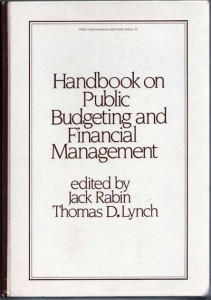 Edited by
Edited by
Jack Rabin
Thomas D. Lynch
(public administrator and public policy; 12)
includes indexes.
1. Budget–Addresses, essays, lectures.
2. Finance, Public–Addresses, essays, lectures.
I. Rabin, Jack [date]. II. Lynch, Thomas Dexter,
1942- . III Series.
HJ2005.H27 1983 350.72 82-22140
ISBN 0-8247-1253-6
COPYRIGHT© 1983 by MARCEL DEKKER, INC. ALL RIGHTS RESERVED.
PREFACE
A pronouncement that the decades, of the 1980s and 1990s are to be eras of scarcity for government is a statement taken at face value today. Moreover, few will argue that coping with budgeting and finance in the public sector requires considerable management and decision-making skills.
This Handbook provides in-depth descriptions and analysis of the major areas in budgeting and financial management. As such, it is designed as the major desk reference which any public administration practitioner or academician may need. Thus, while the reader will find essays describing methods and procedures, he or she will also discover philosophical approaches and arguments.
Indeed, the Handbook on Public Budgeting and Financial Management is the kind of “encyclopedic” approach required for this fast-changing field. The editors welcome comments and suggestions from readers so that any future works will have the benefit or reader’s response.
about the book…
Handbook on Public Budgeting and Financial Management offers a comprehensive, single volume source of up-to-date information at your fingertips. Each chapter in this outstanding guide-written by 25 leading authorities in the field-provides complete coverage of a specific topic, facilitating quick, sound, day-to-day judgments. This encyclopedic monograph presents in-depth essays describing all the methods and procedures of budgeting and finance, as well as philosophical approaches to, and arguments on, subjects discussed.
Handbook on Public Budgeting and Financial Management provides indispensable information and techniques for public administrators who must keep abreast of up-to-the-minute changes in the field…academicians who need a convenient,readily available reference…graduate students who require a reliable, primary text on budgeting for courses including Introduction Fundamentals of Public Budgeting, Planning and Programming in the Public Sector, Introduction to Public Finance, Public Budgeting and Decision Making, and Budgeting Policy and Analysis…libraries and offices of planning commissions, and federal, state, and local, agencies who want to provide staff and personnel with the finest resource of information available.
Jack Rabin
Thomas D. Lynch
Handbook of Organization Theory and Management the Philosophical Approach
Handbook of Organization Theory and Management The philosophical Approach
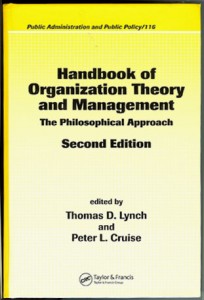 ISBN: 0-8247-0113-5
ISBN: 0-8247-0113-5
Copyright c 1998 by MARCEL DEKKER, INC. All rights Reserved.
PREFACE
This book is addressed to uniting philosophy and public administration. Few subjects are more influenced by philosophy than the form of governance a public selects to guide and administer its public affairs. Yet, the literature has been strangely silent about the relationship between the two-until now. It is our hope that this book will inspire many more efforts to explore this most important of relationships, especially because the real work has only just begun. At the dawn of a new millennium, it is particularly appropriate to build such bridges from the past to the future and to rediscover our roots while contemplating our intellectual progress.
The history of this project began while Thomas D. Lynch, the senior editor, was teaching a graduate seminar at Florida Atlantic University. The course required students to examine the philosophical and epistemological foundations of modern organizational and political theory. Students loved the seminar as if opened their eyes to a much larger world than traditional courses in organization theory typically covered. The understanding that public administration’s current tasks and ideas are relevant to the most sophisticated work in intellectual history is always a remarkable discovery, and to integrate those ideas with modern approaches to organizational management is an enlightening process. However, Dr. Lynch was frustrated by the lack of integrated literature on this subject. Todd J. Dicker, one of Dr. Lynch’s brightest Ph.D. students in this seminar, was kind enough to join this massive project, which took over three years to complete.
The process of recruiting chapter contributors began by carefully scanning the body of literature to identify potential authors. A great deal of effort was devoted to identifying potential authors who had already made significant contributions to the literature on their topics and had established reputations as thinkers and scholars. The editors are extremely proud of the caliber of those authors who have contributed to this volume and the extraordinary quality of their contributions.
A very pleasant addition to his project was Lisa Pelosi at Marcel Dekker, Inc. Under her gentle and positive prodding, the project kept moving along on schedule. Thanks are necessary to Ms. Pelosi, who also had the challenge of copy editing the manuscript. In addition, Mrs. Shirley DeJean, Secretary of the public Administration Institute at LSU. deserves thanks.
A special thank you must go to Richard Omdal, Dr Lynch’s voluntary graduate assistant, who deserves to be singled out. Mr. Omdal, now Ph.D. student, worked for Dr. Lynch without compensation. His tireless management of a large number of manuscripts and mountain of correspondence, especially during the summer months while Dr. Lynch was traveling, eased the lengthy process of completing this project. His useful observations and comments greatly improved the overall quality of the manuscript.
Finally, Todd would like to thank Tom Lynch for originally igniting his interest in philosophy and epistemology, and for adding tinder to the fire by inviting him to participate in this project. The experience of combining so many individual’s efforts into a cohesive work has left a deep and lasting impression on his thoughts and vision of how out epistemology has evolved through history into its current form.
Thomas D. Lynch
Todd J. Dicker
Handbook of Organization Theory and Management
Handbook of Organization Theory and Management.
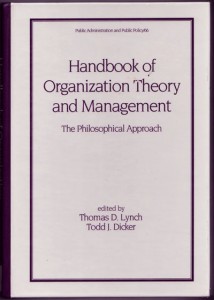 (public administration and public policy; 20)
(public administration and public policy; 20)
Includes index
1. Public administration. 2. Organization. 3. Management. I. Lynch,
Thomas Dexter, [date]. II. Series.
JF1351.07 1983 350′.0001 83-7751
ISBN 0-8247-7021-8
Copyright © 1983 by Marcel Dekker, Inc. All right Reserved.
Neither this book nor any part may be reproduced or transmitted in any form or by any means, electronic or mechanical, including photocopying, micro filming, and recording, or by any information storage and retrieval system, without the permission in writing from the publisher.
PREFACE.
A NEW APPROACH
As a person who has both worked in and taught public administration, I have felt a deep frustration with the two most common approaches to teaching organization theory, The most common method is to historically review the evolution of organization theory literature. The second approach is to explain and debunk other theories of organization and then explain the implicit wisdom of the instructor’s favorite theory. I felt that neither helped the prospective or actual practitioners more easily understand the relevance of theory to the challenges they must face.
My original felling was that I should write a textbook in organization theory, but I soon abandoned that project as impractical. One problem was simply my lack of the time necessary to take on such a vast subject. Another problem was that very diversified knowledge was necessary, and I became aware that the project might best be accomplished by a group of people, with each person assigned to a specific topic. In other words, and organizational approach seemed best. My plan was to select specific subjects that public mangers commonly face as administrative challenges in their work. I then asked outstanding individuals to write on each topic with the expressed intention of orienting the chapters to practitioners of public administration. They were also asked to search out political and organizational normative theory which would best help practitioners better understand each chapter topic. I doubt if there are simple answers to today’s and tomorrow’s administrative problems, but an awareness of past thought on hey subjects can help professionals better deal worth their challenge.
In trying to develop answers to contemporary problems, I have noticed that the same set of solutions as developed in the past tend to be advanced in contemporary settings. Normally the contemporary advocates do not realize their “solutions” were better presented by thinkers in the past; we fail to take advantage of the literature. By knowing the literature, one can often anticipated and even improve on or more easily refute the arguments of others. Also, one can build upon the excellent ideas of others instead of working de nove on each challenge.
Why not profit from their efforts?
USE AS A TEXT
In order to facilitate the use of this book as a text in organization theory, the editor has added review questions for each chapter and included an appendix of chapter study questions. The study questions can be used to guide calls discussion. The review questions can be used to help students reconsider the material in each chapter and can even be used as a set of comprehensive exam questions to be drawn upon by the instructor. the questions are meant to provoke thought using the material in the chapter. but in some cases they go beyond that material conceptually.
The reader should at the completion of this book have a better understanding of the relevance of organization theory to the continuing problems of administering public organizations. Simple answers may not be forthcoming, but readers should understand the true complexity of the problems they face and why simple solutions are not workable. If they do. the objective of this book has been accomplished.
ACKNOWLEDGMENTS
Putting this book together was an enjoyable task because of the high caliber of talent and serious scholarship of the authors. Thanks must be give to Jack Rabin for this help. special thanks go to Dixie Jenning and Marion Malove for their excellent secretarial assistance.
Thomas D. Lynch
Government Budget Forecasting Theory and Practice
Government Budget Forecasting: Theory and Practice
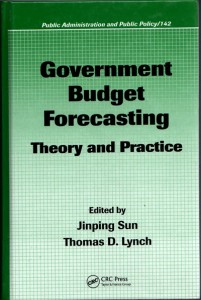 Edited by Jinping Sun and Thomas D. Lynch p. cm.
Edited by Jinping Sun and Thomas D. Lynch p. cm.
Includes bibliographical references and index.
ISBN-13:978-1-4200-4582-6
ISBN-10:1-4200-4582-2
1. Local budgets–United states–States. 2. Local finance–United states–states. I. Sun, Jinping. II. Lynch, Thomas Dexter, 1942-
KJ9147.G68 2008
336.02’730112–dc22
© 2008 by Taylor & Francis Group, LLC
Printed in the United States of America on acid-free paper
Acknowledgments
This book is a product of the work of numerous individuals. We would like to dedicate this book to the late Jack Rabin of The Pennsylvania State University, who over they years was committed to advancing the art and science of public budgeting and was very encouraging and supportive of this project.
We would also like to acknowledge the Taylor & Francis Group’s editorial and production team, particularly Richard O’Hanley, Cartherine Giacari, Joette Lynch, and Jennifer Genetti for their patience, support, and assistance throughout the process. We are also grateful to the dedicated work of the staff at Macmillan India during the manuscript editing process.
This book draws on the work of more than 20 contributors (practitioners and scholars), who made this intellectual dialogue and collaboration possible. We enjoyed working with them and are grateful for the time and effort they put into this project.
we would also like to thank our colleagues at California State University, Bakersfield and Louisiana State University for their constructive comments.Special thanks to Jeffrey Marshall, a graduate student at California State University, Bakersfield, who provided fine editing and other technical services.
This book would not have been possible without the support of our families. We would like to dedicate this book to Xiaojun Ren and Cynthia E. Lynch who, with love and encouragement, have been very patient and committed to what we are doing.
Jinping Sun
Thomas D. Lynch.
Federal Budget & and Financial Management Reform
Federal Budget & Financial Management Reform
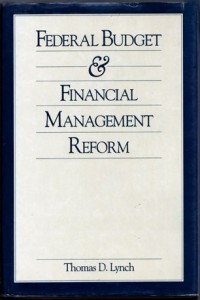 Library of Congress Cataloging-in-Publication Data
Library of Congress Cataloging-in-Publication Data
Federal budget and financial management reform /[edited by] Thomas D.
Lynch
p. cm.
ISBN 0-89930-538-5
1. Budget-United states. 2. Finance, Public-United States.
3. Government spending policy-United States. 4. United States-
Appropriations and expenditures. I. Lynch, Thomas Dexter, 1942
HJ2052.F4 1991
353.0072’2-dc20 90-20711
British Library Cataloging in Publication Data is available
All rights reserved. No portion of this book may be reproduced, by any process or technique, without the express written consent of the publisher.
A collection of original essays by specialists in the field, this book examines the crucial budgetary and financial management problems that face the U.S. government and makes concrete recommendations on how current processes can be improved. The authors make it clear that although the present federal budgetary and financial management systems are not working, the case is far from hopeless.
Several chapters analyze the flaws in the federal budget-making process that lead to deadlock between the president and Congress and ultimately to higher deficits. To remove the checks and balances system from its present political stalemate, a workable two-stage budgetary process is suggested and bipartisan action at the highest level in strongly urged.
Another chapter explains the context in which forecasting is used in federal government budget making address the problem of the failure to predict the yearly budget deficit with reasonable accuracy. Proposals for improving public financial management include centralizing financial management functions, improving debt collections practices, eliminating deficiencies in the application of information technology, and “privatizing” entities such as the postal service, AMTRAK, and Social Security. Providing clarification of complex issues together with constructive approaches to reform, this book will be of internet to both general readers and scholars, students, public policy, and financial management.
Copyright © 1991 by Thomas D. Lynch
Exercises in Public budgeting
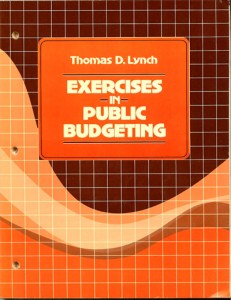 Library of Congress Cataloging in Publication Data
Library of Congress Cataloging in Publication DataLynch, Thomas Dexter
1. Budget-United States-Problems, exercises, etc.
I. Title
HJ2051.L925-1983 350.72’2’0973 82-9796
ISBN 0-13-294082-5 AACR2
© 1983 by Prentice-Hall, Inc., Englewoos Cliffs, N.J. 07632
All rights reserved. No part of this book may be reproduced in any form or by any means without permission in writing from the publisher.
Printed in the United States of America.
While this book is primarily my own work and responsibility, other writers have contributed some exercises. Sydney Ducombe produced the ZBB Exercises and A. John Vogt produced the Preparation Exercises. In addition, Susan Threldkeld assembled Appendices A and B, Moreover, credit for many exercises throughout this book must go to the Management Sciences Training Center, U.S. Office of Personnel Management. Thanks are extended to Jeannie Swain and Dixie Jennings for typing, research, and other essentials. Thanks also to the reviewers, including Carol Lewis and Carol Barry.
Thomas D. Lynch
North Miami, Florida
